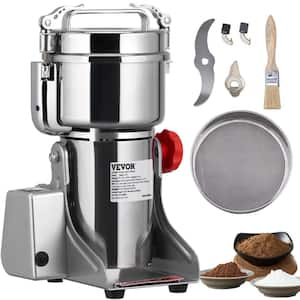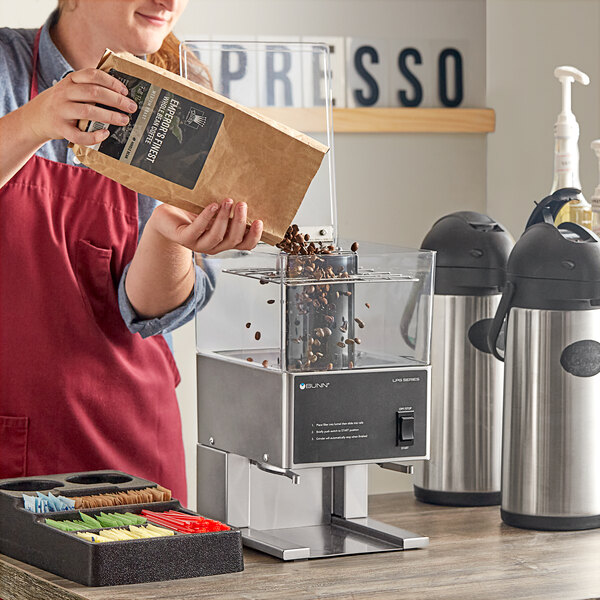Industrial Coffee Mill Guide: Boost Efficiency and Top Quality
In the competitive landscape of coffee production, choosing the appropriate commercial coffee grinder plays a crucial function in improving both effectiveness and item quality. Recognizing the subtleties of various mill kinds and vital functions-- such as personalized work settings and robust building and construction-- can substantially affect the final flavor profile of the coffee.
Recognizing Grinder Kinds
When choosing a commercial coffee mill, recognizing the numerous kinds readily available is important for maximizing both flavor removal and operational effectiveness. Both primary kinds of grinders are blade mills and burr mills. Blade mills use sharp blades that slice coffee beans into irregular dimensions, causing unequal extraction and possibly undesirable tastes. While blade mills are often a lot more ideal and economical for small-scale procedures, they are typically not suggested for industrial usage.

Ultimately, choosing the best sort of mill is essential to maintaining top quality and performance in coffee manufacturing, making it vital for services to purchase high-quality burr grinders for optimum outcomes.
Secret Functions to Take Into Consideration
Choosing a commercial coffee grinder needs careful consideration of several essential attributes that can dramatically influence both performance and the overall coffee experience. Among the primary elements to evaluate is the grinding device. Burr grinders are usually favored over blade mills, as they supply a regular work dimension, which is vital for optimum removal and taste.
An additional essential attribute is the grinder's capacity. A functional mill with numerous settings enables you to customize the work size to various developing methods, improving the coffee's taste account.
The building and construction product likewise contributes in longevity and maintenance. Stainless steel parts frequently supply long life and are much easier to cleanse, which is necessary for preserving hygiene standards. Lastly, assess the mill's noise degree, specifically in a busy coffee shop or manufacturing atmosphere, where extreme sound can be turbulent. Buying a mill that balances these functions can greatly enhance both operational efficiency and the quality of the coffee offered.
Optimizing Grinding Refine
To accomplish the best lead to coffee preparation, enhancing the grinding process is vital. The work size substantially influences removal, flavor, and overall top quality of the made coffee. Various developing methods call for specific work sizes; for example, coffee demands a great work, while French press demands a coarse appearance. Recognizing the relationship in between work size and developing method is the primary step in optimization.


Additionally, keeping an eye on the grinding rate can optimize the procedure. Slower grinding often generates much less warmth, additional resources maintaining fragile flavors and fragrances. Alternatively, faster grinding might produce excessive heat, adversely influencing the coffee's high quality.
Upkeep and Treatment Tips
Appropriate maintenance and care of commercial coffee mills are vital for ensuring ideal efficiency and durability. Regular cleansing is the foundation of upkeep; residue buildup can influence flavor and grinding effectiveness. It is suggested to cleanse the mill after each usage, wiping down the exterior and getting rid of any coffee premises from the burrs.
Additionally, examine the grinding burrs for damage. Dull burrs can compromise work consistency, so they must be changed as needed. Industrial Coffee Grinder. Occasionally adjusting the grinder is additionally critical, as this keeps the preferred work size for various brewing methods
Lubrication of relocating parts must be carried out according to the manufacturer's specifications, as this minimizes friction and lengthens the life of the devices. It is crucial to make use of food-grade lubricants to make sure security and compliance with health regulations.
Last but not least, keep the grinder in a dry and stable atmosphere to protect against rust and rust. By sticking to these upkeep and treatment ideas, drivers can improve the efficiency of their industrial coffee grinders while making certain high-grade outcome and prolonged operational life.
Return on Investment Analysis
Examining the roi (ROI) for industrial coffee grinders is i loved this vital for organizations seeking to enhance their coffee manufacturing abilities. A thorough ROI analysis assists figure out the monetary practicality of purchasing top quality grinders, permitting organizations to consider the first costs versus possible gains.
Examine the purchase cost of the grinder, consisting of installation and any needed modifications to existing facilities. High-performance mills frequently lead to lowered grinding time and raised throughput, which can dramatically boost performance.
In addition, take into consideration the impact on product quality. Industrial Coffee Grinder. Superior grinders generate a more constant grind dimension, which can boost taste profiles and client complete satisfaction, eventually driving sales. By boosting the quality of the end product, businesses can warrant higher rates, causing boosted profits
Conclusion
In recap, an industrial coffee grinder plays a critical role in enhancing both efficiency and product high quality within coffee manufacturing. Eventually, the calculated investment in a reputable grinder contributes substantially to enhanced income and competitiveness in the coffee industry.
In the affordable landscape of coffee manufacturing, picking the best commercial coffee grinder plays an essential role in enhancing both performance and item quality. The 2 main types of mills are blade mills and burr grinders. Within the burr mill group, there are flat burr mills and conical burr grinders, each with its benefits. Burr mills are usually preferred over blade mills, as they give a consistent grind dimension, why not check here which is important for optimal removal and flavor.
In summary, a commercial coffee mill plays a crucial function in enhancing both efficiency and item quality within coffee manufacturing.